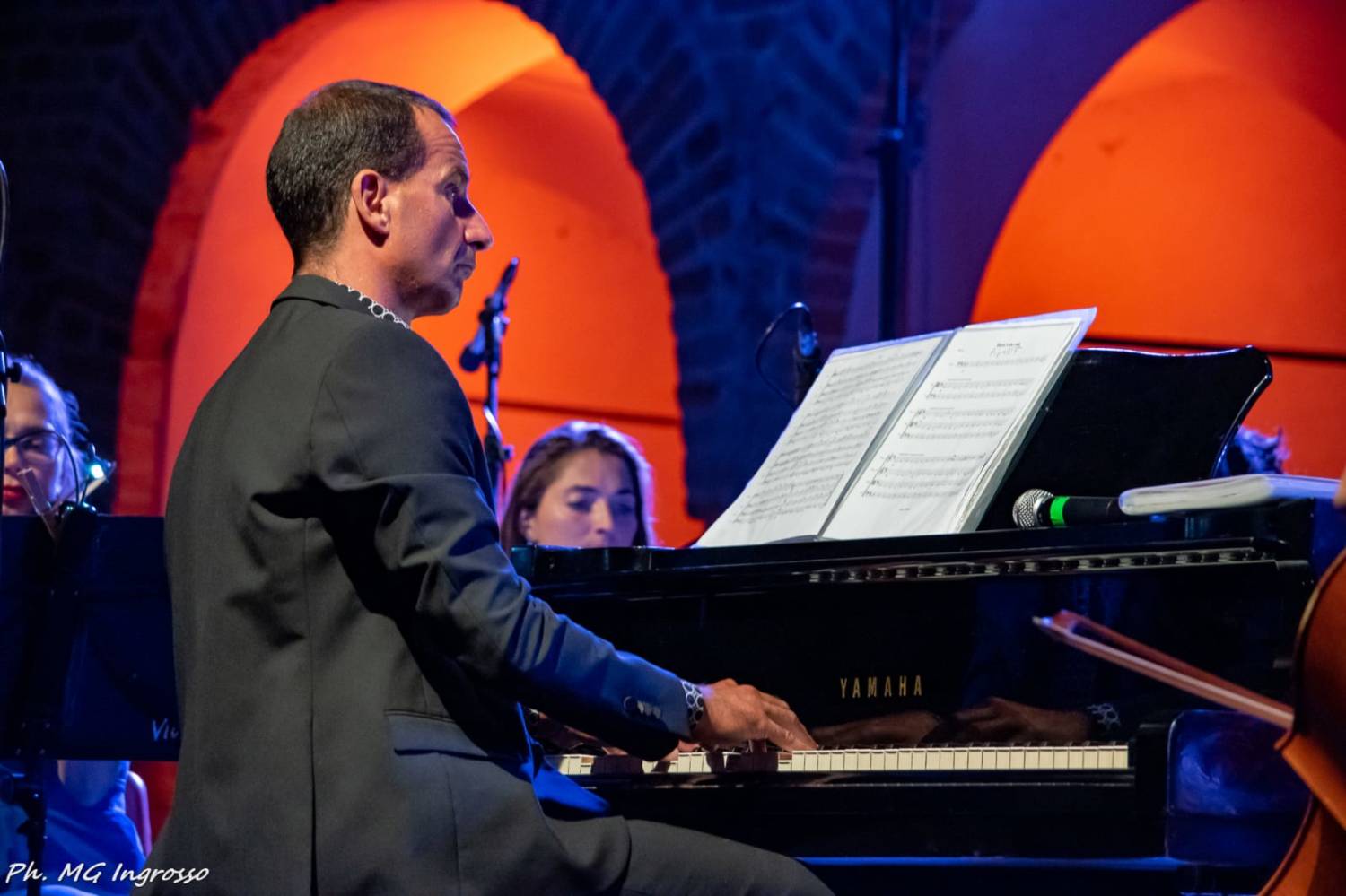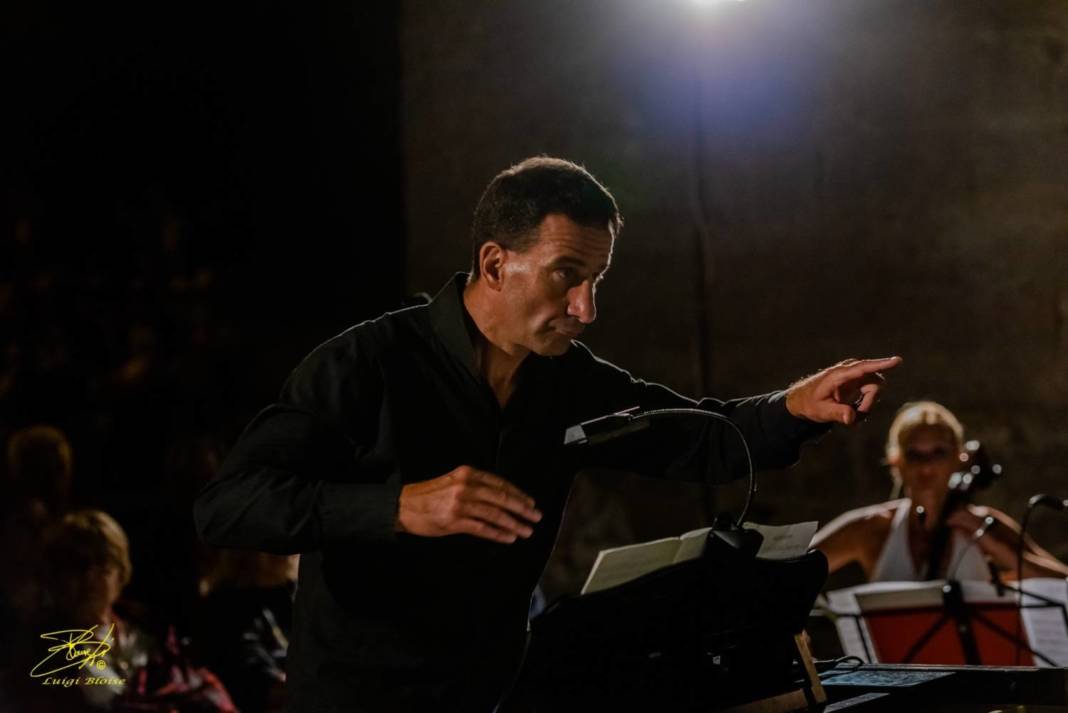Interview with Yiorgos Savvinides.
An accomplished conductor and pianist who has performed in major venues in Italy and Europe, Andrea Albertini has recently linked his name to that of Ennio Morricone, a leading Italian composer and world-famous film musician.
Along with the all-female ensemble “Le Muse,” Albertini is touring the globe performing Morricone’s songs, which include some of the most famous soundtracks in the history of cinema.
On the occasion of the ensemble’s concerts in Limassol and Nicosia on May 20 and 21, Albertini talks to Phileleftheros about the peculiarities of Moricone’s music and explains why he considers him his mentor.
What are the characteristics of an all-female ensemble?
I believe that a woman’s approach to music is different from a man’s. Especially with string instruments, which, mostly, are the mirror of who we are. A string instrument is “modelled” over the years by an instrumentalist in his image and likeness. Only the human voice is a reflection of the soul more than a violin, a cello, or a viola. So, the way of playing of a woman is recognisable in my opinion: the transients are sweet and delicate. The expressiveness is marked, and the rhythmic and dynamic moments are “gentle”, not rough. I would recognize the sound of my ensemble among thousands.
How does an ensemble tune into Ennio Morricone’s music?
Dealing with Ennio Morricone’s music poses, first of all, two kinds of problems. The first is the fact that the Maestro never wanted to publish any of his scores when he was alive and, even today, the family keeps them strictly owned and only his son Andrea has exclusive use of them. This means that whoever wants to make a tribute to his music must transcribe “by ear” what the Maestro has performed, listening over and over again to the pieces carefully, in order to translate them into notes on the staff and then, perform them. This is long, meticulous and difficult work if you want to be as close as possible to the original text.
Another type of problem for a chamber ensemble, such as “Le Muse”, is due to the fact that Morricone’s compositions have a symphonic breath (great choirs and orchestras with an enlarged rhythmic section, extensive use of percussion, etc). And so, during the transcription work, I also had to deal with the problem of “reducing” his symphonic scores for a small chamber group. I hope I have been able to express the genius of Morricone’s music with a few instruments. I wish he were happy with the work I did. If only he could hear it.
What is the deeper purpose of this tribute ensemble?
This tribute is the deepest act of love from me for his music. I truly consider him a great composer, one of the greatest Italian composers. His music lives even without cinema, without images, because it is beautiful music already on the paper. We have to consider that, at his concerts, there weren’t film images, but only music, and were followed by tens of thousands of people. When I heard him in Munich, in front of 15,000 people, he played almost three hours of music, three encores and he was welcomed like a great rock star. And, if his music is also performed with the projection of the film sequences, then the emotional picture is truly complete. That’s why his music also works with a small chamber ensemble, such as Le Muse, because it is, without a doubt, beautiful music. And then performed by a female ensemble. What more do we want!
What are the difficulties of performing film scores compared to other types of orchestral music?
We have to think that film music is descriptive music. And this type of music has ancient origins: just think of Antonio Vivaldi’s Four Seasons, then Beethoven’s Pastoral Symphony, or Debussy’s Le Mer. How can Vivaldi’s Primavera be performed well, if we don’t think of certain images well described by the poetry that accompanies this music: the chirping birds, the leaves moved by the wind? Here is the same, if you want to perform the “Mission” or “The Legend of the Pianist on the Ocean” or the music of Sergio Leone’s Westerns. We must understand the descriptive context well, having seen the film, and knowing its aspects, not only musical but also cinematographic and historical. I ‘force’ my musicians to see the films we are going to perform and, sometimes, I ask them to remember what happens in the scene we are performing. The secret is to paint with the notes what happens on the film set. Leone often used to bring Ennio’s music on the set, while they were filming, because he thought the actors could perform better in the scene.
How did your relationship with the music of Ennio Morricone begin and how has it evolved?
Let’s say it started a bit by accident. When, in 2016, Morricone was nominated for the Oscar for the best soundtrack (the Oscar then arrived with the film “The Hateful 8″, directed by Quentin Tarantino) my agent, Giuliano Ferrari, told me: “Look, that’s a good time, they will really give him the Oscar and it would be nice to do a tribute to his music.”
And so, song after song, this project was born, that allowed us to travel around the world. Our programme has been enriched with new songs – we have about fifty in the repertoire- I think they are the most significant pieces of his music. His love for music grew parallel to his number of songs. I read a couple of his biographies and I met him a few times…it’s as if he was my teacher. Although I have never taken composition lessons from him, I feel as if he was my teacher.
In your opinion, what makes a soundtrack great?
Music is a powerful means of communication, perhaps the most powerful form of expression, capable of surpassing the word. When this special power of music is merged with another art (such as cinema) it can create a truly explosive set of emotions. Music in cinema has always played a fundamental role alongside images: it has never been a trivial musical commentary but a real added value to the scene. The use of a particular music combined with an image tells us more than what the eye suggests. Film music is therefore great and successful when it reinforces emotions, thus generating a strengthening effect on the suggestions transmitted by the film.
The history of film music is parallel to that of cinema, it has developed and evolved following cultural and musical trends and still today it continues to be an integral part of film production. Starting from its origins, from the silent film era when the soundtrack was performed live. Film music is therefore great music when it plays the very important role of being able to say what words and images don’t say when it succeeds in revealing effective psychological movements that cannot be said in any other way. But let’s not forget that film music is great music when it’s beautiful. Music and Morricone’s music undoubtedly are.
How would you describe inspiration as a concept and as a process?
It’s really difficult to answer this question. Mahler declared not to compose, but “to be composed” and also Aristotle defined the artist as one who is “possessed” by art. How many times, listening to a piece of music, of any genre and style, do we wonder what the composer was thinking at the time of writing it? If the pages are cheerful we imagine the composer smiling, if they are subdued we assume that he was saddened by some painful event. In reality, sometimes, by virtue of our ability to recall past moments, the author manages to write music that is absolutely contrasting with his mood, and with amazing results. It is known, for example, that Mozart wrote his last two bright symphonies during the darkest period of his life, while Mahler elaborated on the sixth Symphony, not surprisingly called “the tragic” at a time when he told his wife “it was flourishing like a flower”. Musical inspiration, however difficult to define, is the daughter of our studies, our experiences, and our ability to get excited. But as Morricone said, musical inspiration is definitely the daughter of meticulous and serious work.
What is a conductor’s worst fear?
I can admit my fear. It is a fear that has sometimes become reality and when this fear has become reality, I have lived in a nightmare that haunts me every time I perform. Let’s start with an assumption: I am very possessive of my scores: I don’t allow anyone to keep them. I am the keeper of my music. Morricone was like that too (and I say this without attempting to compare myself to him), but I remember how in concert he would go up on stage with his big books under his arm and, once finished, he would take them back to his dressing room—perhaps a superstitious gesture, maybe a fear that someone could somehow “abduct” his notes. In any case, like the great Ennio, I too personally carry my scores and also those of the whole orchestra and after the concert, I take them back to my studio. And so far nothing strange. All is normal until I happened to arrive at a concert without musical parts, forgetting the scores in the home studio. The results of that concert were obviously disastrous. So my biggest fear is forgetting the music scores in my home studio.
What made Ennio Morricone a musical genius of our time?
Here too it is difficult for me to answer. It is a magical and difficult-to-define combination of factors. First of all, his very serious musical studies (Morricone graduated in Rome in a truly top-level Italian avant-garde compositional climate: the school of Ildebrando Pizzetti). Secondly, his very serious work, Giuseppe Verdi spent his first years as a composer n prison. Morricone also spent time in prison. There, he worked a lot both on film composition (500 soundtracks) and on the arrangement of Italian songs that later became famous (Sapore di sale, Abbronzatissima). He said about himself “I am the son of all the music I’ve studied.” Finally, his inexplicable ability to arouse emotions. And herein lies the magic of genius. A genius is a genius because he is inexplicable, as Morricone has become. Otherwise, we would study his work, and sooner or later we would understand how one can become a genius, so we all would be geniuses.
Which Ennio Morricone soundtrack would you choose for your life?
First of all, I would like to reveal a little secret. In one of our meetings, I asked him what his favourite soundtrack was. He answered Malena. Malena is the breath of the soul. Malena is a musical miracle in a not-so-amazing film. I personally (and perhaps trivially) vote for Mission. I must have performed this piece a few hundred times. Well, I never get tired of getting excited. Every time.

Media Sponsors: Phileleftheros & in-cyprus.com
Read more:






